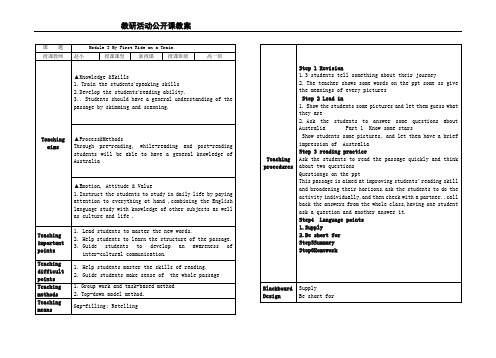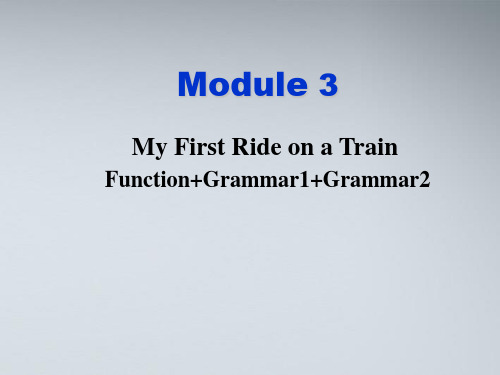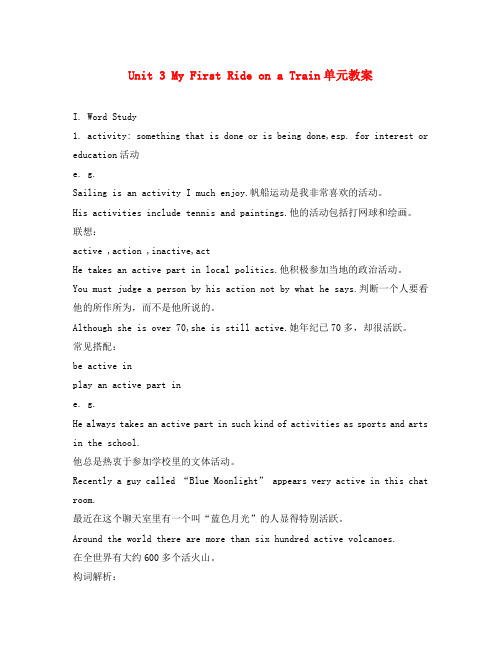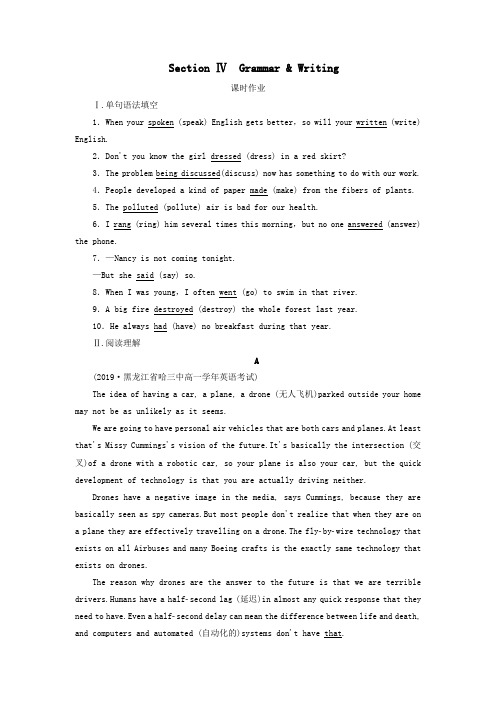Module3 My first ride on a train-Grammar学习型教学案
- 格式:doc
- 大小:23.00 KB
- 文档页数:13


外研社高一英语必修一Module 3 My First Ride on a train Topic:My First Ride on a trainType:Reading1.Analysis of teaching material1.1.Status and functionsThe topic of this module is My First Ride on a Train,which can easily draw students’ attention and help them revise t he transport.The grammar point is the Past Tense that can be used when students describe their experiences.Therefore,this module is important,and it can help students talk about their trip they made to a tourist spot or other life experiences.2.Analysis of students2.1.Senior one students have learned the Past Tense before.2.2.They are able to talk about some simple topics and are curious about the foreigncountry.2.3.They can induce some language points themselves2.4.They are supposed to improve their reading skills.3.Teaching objectives3.1.After the lesson,students are able to understand these words on Page 22.3.2.Students can talk about their trip experiences using Past Tense3.3.Students are capable of talking about the general information aboutAustralia,and realizing the diversity of scenery and culture in different countries.4.Teaching methodsTask-based Language TeachingSituational Teaching Method5.Teaching key points and difficulties5.1.Key points5.1.1.The words on page 225.1.2.The usage of Past Tense5.1.3.Practice of reading skills5.1.4.How to talk about trip experience5.2.Difficulties5.2.1.Practice of reading skills5.2.2.How to talk about trip experience6.Teaching aidsMultimedia Blackboard7.Teaching progress7.1.Leading-inUse three questions which are related to students’ real trip experience to arous e students’ interest:Where did you go before?How did you get there?Did you enjoy it and why?T: Good morning, everyone.Today’s topic is travel,do you like it?S: Yes!We like it.T: So,boys and girls, have you ever been to someplace?Would you like to share something with us?Who wants to be the first one?Put up your hands,please.T: Yang Qing,please.Where did you go before?How did you get there?Did you enjoy it and why?S:……T:Wonderful experience,thank you!Now,please look at the sc reen,let’s revise these transportation words together,ok? First of all,tell me what’s this?S: 渡轮。


Unit 3 My First Ride on a Train单元教案I. Word Study1. activity: something that is done or is being done,esp. for interest or education活动e. g.Sailing is an activity I much enjoy.帆船运动是我非常喜欢的活动。
His activities include tennis and paintings.他的活动包括打网球和绘画。
联想:active ,action ,inactive,actHe takes an active part in local politics.他积极参加当地的政治活动。
You must judge a person by his action not by what he says.判断一个人要看他的所作所为,而不是他所说的。
Although she is over 70,she is still active.她年纪已70多,却很活跃。
常见搭配:be active inplay an active part ine. g.He always takes an active part in such kind of activities as sports and arts in the school.他总是热衷于参加学校里的文体活动。
Recently a guy called “Blue Moonlight” appears very active in this chat room.最近在这个聊天室里有一个叫“蓝色月光”的人显得特别活跃。
Around the world there are more than six hundred active volcanoes.在全世界有大约600多个活火山。
构词解析:act: n. & vi. 行动,行为,表演,表现Think before you act!三思而后行!Tom Cruise acts in many movies, and the one I enjoy most is called Mission, Improbable.汤姆·克鲁斯在很多电影中扮演过角色,我最喜欢的是《蝶中碟》。

Section ⅣGrammar & Writing课时作业Ⅰ.单句语法填空1.When your spoken (speak) English gets better,so will your written (write) English.2.Don't you know the girl dressed (dress) in a red skirt?3.The problem being discussed(discuss) now has something to do with our work.4.People developed a kind of paper made (make) from the fibers of plants.5.The polluted (pollute) air is bad for our health.6.I rang (ring) him several times this morning,but no one answered (answer) the phone.7.—Nancy is not coming tonight.—But she said (say) so.8.When I was young,I often went (go) to swim in that river.9.A big fire destroyed (destroy) the whole forest last year.10.He always had (have) no breakfast during that year.Ⅱ.阅读理解A(2019·黑龙江省哈三中高一学年英语考试)The idea of having a car, a plane, a drone (无人飞机)parked outside your home may not be as unlikely as it seems.We are going to have personal air vehicles that are both cars and planes.At least that's Missy Cummings's vision of the future.It's basically the intersection (交叉)of a drone with a robotic car, so your plane is also your car, but the quick development of technology is that you are actually driving neither.Drones have a negative image in the media, says Cummings, because they are basically seen as spy cameras.But most people don't realize that when they are on a plane they are effectively travelling on a drone.The flybywire technology that exists on all Airbuses and many Boeing crafts is the exactly same technology that exists on drones.The reason why drones are the answer to the future is that we are terrible drivers.Humans have a halfsecond lag (延迟)in almost any quick response that they need to have.Even a halfsecond delay can mean the difference between life and death, and computers and automated (自动化的)systems don't have that.So, our transportation network of the future, both on the ground and in the air, will actually be safer when we turn it over to computers.There really aren't any technological difficulties to this idea.The biggest difficulties we have are psychological and cultural, in terms of giving up the car, but no new tech needs to be developed to have your own personal flying car.What we have to do is improve production and reduce manufacturing costs.People should be excited about this:it promises much in terms of safer travel, and people in parts of the world where the road and air networks are poor will be able to get the goods and services.【解题导语】这是一篇说明文。

Module 3 My First Ride on a TrainI. 教学内容分析本模块以My First Ride on a Train为话题,通过在作者的澳大利亚之行来介绍其独特景色。
通过模块教学,使学生学会用正确的时态和短语来描述自己的旅游体验,并掌握有关交通工具和各种地点及活动的词汇。
要求学生学会如何在日常生活中正确使用礼貌用语以及如何在会话中做出回应、表明态度。
Introduction 部分复习和学习有关日常交通工具的名词和相关搭配的动词,通过激活学生有关旅游经历的图式,引出本模块的话题。
Reading and Vocabulary 部分是本模块的主要内容,介绍了作者第一次在澳大利亚乘火车旅游的经历,详细描写了旅途中的活动和途中的风景,并介绍了Ghan train的由来。
通过学习生词以及短文,训练学生的微观阅读技能。
Grammar 包括两个部分,第一部分是动词的-ed形式做形容词充当定语及定语的成分;第二部分是回忆、熟悉和运用过去时间的表达法。
Function 练习让学生学会在不同场合要注意语言使用的得体性。
Vocabulary列举了各类活动场所和其相关联的词汇。
以此来激活学生的记忆图式为后续活动热身。
Reading and Speaking 部分是五篇有关童年回忆的段落,叙述在童年第一次印象深刻的故事,让学生了解叙事的基本要素,通过阅读为后面的话题写作提供了素材。
Writing部分要求学生用第一人称写一篇有关自己印象深刻的经历的短文,训练学生记忆、整理和归纳等逻辑思维能力,并学会如何做好笔记。
Everyday English 部分训练学生运用语言交际的技能,并要求学生掌握表达强烈情感态度的交际用语。
Cultural Corner部分是一篇关于上海磁悬浮列车干线的文章,让学生知道这种列车是世界上速度最快的,并体会这种车的优点,从而培养学生的民族自豪感。
Task部分要求学生利用已有的旅游纪念品和资料等,向同伴介绍一个风景名胜点。
Module3 my first ride on a train教案本资料为woRD文档,请点击下载地址下载全文下载地址module3 myFirstRideonaTrainⅠ.TheGeneralIdeaofThismoduleThetopicofthismoduleismyFirstRideonaTrain.Thismodul ewilldescribethescenecharacteristicsbytravelingtoAu stralia.wewilllearnsomewordsaboutvehiclesandnatural phenomenainthismodule.ontheotherhand,wewilllearngra mmarontheusageofthe–edform.Also,wewillgetthestudentstodescribetheirtravelingandnaturalscenerywiththesewords.Thewordswiththe-edf ormcanbeusedasadjectivesandgivesomeexamples.wewillt rainthestudent’sabilitiesoflistening,speaking,readingandwriting.wh at’smore,Iwillleadthestudentstogoovertheusageofthepast timeexpressions.INTRoDUcTIoNInthismodule,we’lllearnsomenewwordsonvehicles.Recallthestudents’happychildhoodonthefirstride.READINGANDVocABULARy Totrainreadingskillbyskimmingandscanningthepassage.Enablethestudentstoimproveabilitiesofimagination,an alysisandthinkinginEnglish.GRAmmARThe-edformcanbeusedasadjectivesandattributiveadject ives.FUNcTIoNLearntouseeverydayEnglishtoexpressgoodmanners.VocABULARyLearnsomewordsonplaces,usingthesewordstoconnectthe relatedknowledge.READINGANDSPEAkINGReadthepassageonrecallingchildhood.Togetthegeneralideabyreadingthepastexperience.Togetthekeypoints.makeasimilardialogue.LISTENINGTotrainthestudents’abilitytocatchthekey.wRITINGLearntomakenotesbyreadingthepassage.PRoNUNcIATIoNHowtoreadthe correctstress ofthesentencesEVERyDAyENGLISHGiveresponsetothedialogue.cULTURALcoRNERToknowtheadvantagesaboutmaglev—thefastesttrain.TASkDescribethetravellookingatphotots,postcards...moDULEFILETohelpthestudentstoconcludethecontent.Totestwhattheyhavelearned.Ⅱ.Three-DimensionalGoals.knowledgeandSkillsTowritedownthesentencesandpassageincludingthenewwor ds,phrasesand-ed words.Toreadthepassagetotrainthestudents’abilityofskimming.Torecallthepastexperienceusingthepasttime;makingadi alogueusingpoliteways.2.ProcessandmethodsTeacher’sguidanceandteachingleadtheSstoknowthenewachievemen tsincludingmaglev.ActivityandInquiryToknowthetravelcultureinmanyplacesintheworld.Toknowhowtodoingoodmanners,learntobepolite.3.EmotionandValuesArousethestudents’lovefortheirmotherland.Getthemtofeelproudofsocialachievement.Ⅲ.TeachingImportantPointLearnthepassageandsentence structure.Ⅳ.TeachingDifficultPointGrammar:the-edformandlanguagepoints.Ⅴ.TeachingAidsmultimedia,alittleblackboardⅥ.TeachingTimesevenperiodsThefirstperiod:IntroductionThesecondperiod:ReadingandVocabularyThethirdperiod:ReadingandVocabularyThefourthperiod:Grammar1,FunctionandVocabularyThefifthperiod:Grammar,ReadingandSpeakingThesixthperiod:Listening,writing,PronunciationandEv erydayEnglishTheseventhperiod:culturalcorner,TaskandmoduleFileTheFirstPeriodTheGeneralIdeaofThisPeriodInthisperiodwe’llfinishthefouractivitiesonPage21.Thenpractisespeakingafterthemodel.AtlastI’llgivefoursituationstodiscuss.TeachingAims.Tolearnandmasterthefollowing:words:helicopter,motorbike,tram,ferryPhrases:geton,getoff,getinto,getoutride,takeoff,landdrive2.Todevelopthestudents’speakingabilitybytalkinganddiscussing.TeachingImportantPoints.Howtoimprovethestudents’speakingability2.Learnsomevocabularies.TeachingDifficultPointHowtoimprovethestudents’speakingabilitybymakingsomedialoguescorrectly.Teachingmethods.Answeringactivitytohelpthestudentsgothroughvoc abulary2.matchingthewordstoarousethestudents’interestinthenamesofvehicles.3.Individual,pairorgroupworktomakeeverystudentworki nclass.TeachingAids.acomputer2.somepicturesTeachingProceduresStep1GreetingsGreetthewholeclassasusual.T:Goodmorning.Ss:Goodmorning,missLiu.Step2Lead-inT:withthedevelopmentofsociety,wearechangingourlife. moreandmorepeopleliketotravel.Doyouliketraveling?S:yes.T:wherehaveyoubeen?S:TheGreatwall,thePalacemuseum,mountTai,...S:ThewestLake,theGreatwall,...S:...T:Howdidyoumakeyourfirstjourney?S:Bytrain.S:Bybus.S:Bybike.T:Now,we’llreviewthemeansoftransportation.“meansoftransportation”isameansofcarryingpeopleorgoodsfromoneplacetoanothe r.whocangiveusthenamesofthetransportation?S:Bybike/bytrain/bycar/byboat/byplaneoronfoot.Step3PresentationT:openyourbooksatPage21.Let’scometoIntroduction.Firstlookatthepictures.Let’slearnsomewordsaboutvehicles.Ferry,tram,helicopter,motorbikeT:Readaloudandexplainthechinesemeanings.Thenaskthes tudentshowtheytravel aroundmostfrequentlyelicitbasicexpressions.S:Iusuallytravelonfoot/bybike/bybus.T:whohastraveledbytrain/taxi/plane/boat?Explainwher e,whenandwhy.S:IhavetravelledbytraintoBeijing.Beforewedecidethem eansoftransportation,wemustconsiderthetimeandmoneyw ehavetospend,andwhetherwe’llfeelcomfortableandsafeduringourtravels.T:ok.whatyousaidisreasonable.Askthestudentstomatchthewordsintheboxwiththepicture sonthescreen,thencheckwithapartner.checktheanswers withthestudentstogether.Picture 1.motorbike 2.ferry 3.tram 4.train 5.plane 6.bus7.helicopter8.bicycle9.taxiStep4 AnsweringGetthestudentstoanswertheActivity2.Thencheckwiththe mtogether.T:Readthroughthequestionsasthestudentsfollow.makesu rethestudentsunderstandthequestions.T:Askstudentstodotheactivityinpairs.Askingandanswer ing.Thengetthemtocheckwithapartner.S:whichofthevehiclestravelonroad?S:Taxi,bicycles,motorbikesandbusestravelonroads.S:whichofthemtravelonrails?S:Tramsandtrains-travelonrails.S:whichofthemtravelsonwater?S:Ferriestravelonwater.S:whichofthemtravelintheair?S:Helicoptersandplanestravelintheair.S:whichofthemcanyouusetotravelalongdistance?S:youcanuseaplaneoratraintotravelalongdistance.Step5Practice matchtheverbswiththemeansoftransport.Getthestudents todoActivity3..Readthroughtheverbsandhavetheclassrepeatthemaf teryou.geton getoff getinto getout ride drivetakeoff land2.Askstudentstodotheactivityindividually.Theycanche ckwithapartner.3.callbacktheanswersfromtheclass.Suggestedanswers:geton:bus/train/tram/bicycle/motorbike/ferry/planegetoff:bus/train/tram/bicycle/motorbike/ferry/planegetinto:taxi/helicopterride:bicycle/motorbikedrive:train/taxi/bustakeoff:plane/helicopterland:plane/helicopterStep6Speaking.Getthestudentstodescribethefirsttimeyoutravell edalongdistance.2.Putthestudentsintogroupsoffourtoaskandanswerabout theirjourneys.S:IfirsttraveledalongdistancebytrainwhenIwassevenye arsold.IwentwithmyparentsfromNanjingtoBeijing.S:IfirsttraveledalongdistancebytrainwhenIwastwelvey earsold.Iwentwithmyclassmatesandmyteacherfrommyhome towntoBeijing.Thentellthestudentsthefollowing:Ifirsttraveledalongdistancebytrainlastyear.stSpringFestival,Iwenttheretoseetheicycity—Harbin.Therearealotofwonderfulstatues,carvedoutofsn ow.Ihopeyouwillgothereinthefuture.Step7DiscussionT:wecanmakeatripinmanyways.Butwhatdoyouhavetoconsid erbeforeyoudecidethemeansoftransportation?Ithinkwem ustconsidertimeandmoneywehavetospend,andwhetherwe’llfeelcomfortableandsafeduringtravels.Thusisveryrea sonable.Doyouunderstand?T:Nowlookatthescreenanddiscusshowyou’dliketogototheplaces,bytrain,bybusorbyair.Besides,g ivethereasonwhyyoumakethedecision.Situation.fromShanghaitoLondon2.fromBeijingtoGuangzhou3.fromDaliantoQingdao4.fromchongqingtochengduSuggestedideas:.Situation1Byair.It’salongwayfromShanghaitoLondon.It’sthebetterandfasterwaytogettherebyairthanbyship.2.Situation2Bytrain.BeijingisfarfromGuangzhou.wecangettherebytr ainorbyplane.It’sfasterbyplane,butit’sbettertogotherebytrain.onthetrainwecanbecomfortabl eandenjoythebeautifulscenesonthewaythere.Byboat/ship.It’sshorterbyshipthanbybusortrain.meanwhile,wecanenjoy thebeautifulsceneonthesea.3.Situation3Byboat/ship.It’sshorterbyshipthanbybusortrain.meanwhile,wecanenjoy thebeautifulsceneontheseason.4.Situation4Bybus.chongqingisnotfarfromchengdu.Ittakesusonlysev eralhourstogettherebybus.It’sfasterbybusthanbytrain.Step8SummaryandHomeworkTodaywe’velearnedsomevocabularyonthevehiclesanddonesomespea kingandknownhowtochoosemeansoftransportation.Alsowe ’velearnedtodiscribethefirsttimeyoutraveledalongdist ance.Besides,we’velearntsomewords.A.ferry,helicopter,tram,plane,motorbike,distanceB.geton/off/into/out,ride/dive,takeoff,land.Step8TheDesignofwritingontheBlackboardmodule3 myFirstRideonaTrainTheFirstPeriod.words:2.Verbs:helicopter n.motorbike n.getongetofftram n.distance n.getintogetoutalongdistance n.ride/dive/landtakeoff3._________travelonroads_________onrails_________onwater_________intheairStep9ActivityandInquiryStepsStudents!ActingTeacher’sorganizing Lookatthepicturesgivethewords. Showthepicturesonthescreen.2Answerthefollowing.writeontheblackboard.3 writedownthedescription. Givedescription.。
Module 3 My First Ride On a TrainMy First Ride On a TrainMy name is Alice Thompson. I come from Sydney, Australia and I'm 18 years old. Recently I had my first ride on a long-distance train. And what a ride! A friend and I travelled on the famous Ghan train. We got on in Sydney and we got off in Alice Springs, right in the middle of Australia, more than four thousand kilometres away. We spent two days and nights on the train.The train was wonderful and the food was great. We ate great meals cooked by experts! For the first few hundred kilometres of the journey, the scenery was very colourful. There were fields and the soi l was dark red. After that, it was desert. The sun shone, there was no wind and there were no clouds in the sky. Suddenly, it looked like a place from another time. We saw abandoned farms which were built more than a hundred years ago.The train was comfortable and the people were nice. During the day, I sat and looked out of the window, and sometimes talked to other passengers. I read books and listened to my Chinese cassettes (I'm studying Chinese at school). One night, at about midnight, I watched the night sky for about an hour. The stars shone like diamonds.Why is the train called the Ghan? A long time ago, Australians needed a way to travel to the middle of the country. They tried riding horses, but the horses didn't like the hot weather and sand.A hundred and fifty years ago, they brought some camels from Afghanistan. Ghan is short for Afghanistan.Camels were much better than horses for travelling a long distance. For many years, trained camels carried food and other supplies, and returned with wool and other products.The Afghans and their camels did this until the 1920s. Then the government built a new railway line, so they didn't need the camels any more. In 1925, they passed a law which allowed people to shoot the animals if they were a problem. In 1935, the police in a town shot 153 camels in one day.The Maglev - the Fastest Train in the WorldThe fastest train in the world, the Transrapid Maglev, runs between Shanghai’s Pudong Airport and Longyang station in downtown Shanghai. Traveling at a speed of over 400 kilometers per hour, the train can complete the 30-kilometer journey in eight minutes.Maglev mea ns “magnetically levitated”. The Transrapid Maglev is the world’s first high-speed train using magnetic levitation technology. Magnetically levitated trains travel in a vacuum between two magnets. There are no rails and no noise. They travel very fast and they use less energy.On December 31, 2002, Premier Zhu Rongji and the German chancellor attended the opening ceremony of the train service. Both leaders tookthe train to Pudong Airport.On November 12, 2003, the Maglev reached a speed of 501 kilometers per hour on the track between Longyang Station and Pudong, a new world record speed for a train.Module 3 My First Ride On a TrainMy First Ride On a TrainMy name is Alice Thompson. I come from Sydney, Australia and I'm 18 years old.________(recent) I had my first ride on a long-distance train. And what a ride! A friend and I travelled ________ the famous Ghan train. We got ________ in Sydney and we got off in Alice Springs, right in the middle of Australia, more than four thousand kilometres away. We spent two days and nights on the train.The train was wonderful and the food was great. We ate great meals ________(cook) by experts! For the first few hundred kilometres of the journey, the scenery was very colourful. There were fields and the soi l was dark red. After that, it was desert. The sun________ (shine), there was no wind and there were no clouds in the sky. ________(sudden), it looked like a place from another time. We saw ________(abandon) farms which were built more than a hundred years ago.The train was comfortable and the people were nice. During the day, I sat and looked out ofthe window, and sometimes talked to other passengers. I read books and listened ________ my Chinese cassettes (I'm studying Chinese atschool). One night, at about midnight, I watched the night sky for about an hour. The stars shone like diamonds.Why is the train ________(call) the Ghan? A long time ago, Australians needed a way________(travel) to the middle of the country. They tried riding horses, ________the horses didn't like the hot weather and sand. A hundred and fifty years ago, they brought some camels from Afghanistan. Ghan is short for Afghanistan.Camels were much________(good) than horses for ________(travel) a long distance. For many years,________(train) camels carried food and other supplies, and returned with wool and other products.The Afghans and their camels did this until the 1920s. Then the government built a new railway line, ________ they didn't need the camels any more. In 1925, they passed a law ________ allowed people to shoot the animals if they were a problem. In 1935, the police in a town________(shoot) 153 camels in one day.The Maglev - the Fastest Train in the WorldThe fastest train in the world, the Transrapid Maglev, ________(run) between Shanghai’s Pudong Airport and Longyang station in downtown Shanghai. ________(travel) at a speed of over 400 kilometers per hour, the train can complete the 30-kilometer journey in eight minutes.Maglev means “magnetically levitated”. The Transrapid Maglev is the world’s first high-speed train using magnetic levitation technology.Magnetically levitated trains travel in a vacuum between two magnets. There are no rails and no noise. They travel very fast and they use less energy.________December 31, 2002, Premier Zhu Rongji and the German chancellor attended the opening ceremony of the train service. Both leaders took the train ________ Pudong Airport.On November 12, 2003, the Maglev reached ________ speed of 501 kilometers per hour on the track between Longyang Station and Pudong, a new world record speed for a train.。
Module3 My first ride on atrain-Grammar学案www.5ykj.commodule3myfirstrideonatrain-Grammar学案一:过去分词作定语1.及物动词的过去分词作定语表示动作的被动和完成,单个的过去分词作定语置于被修饰的名词前,而短语则位于名词后。
废弃的农场___________________________口语英语__________________________________与专家烹制的饭菜____________________________________2.不及物动词的过去分词无被动含义,只表示动作的完成。
落叶________________________________升起的太阳_____________________________-改变了的世界_____________________________退休的老师_______________________3.有些过去分词失去了被动意义,而作形容词,表示“感到--的”,现在分词表示“令人--的”。
迷惑的表情_____________________________________失望的孩子们___________________________________ 累了的人们__________________________满意的表情______________________4.过去分词可构成合成词作定语widely-usedlanguage________________school-runfactor y_____________________man-madesatellite____________ ___________highly-developedindustry________________ ________注意:分词修饰something,everything,anything,nothing,nobody等不定代词或指示代词those时,要放在这些词的后面。
Heisoneofthoseinvited.练习:1.Therewasan________lookonhisfacewhentheactressappear ed.AexcitedBexcitecexcitingDexcitedly2.It’swrongforthe_________countriestocontroltheworld.AdevelopmentBdevelopingcdevelopedDdevelop3.Ametal________uraniumgivesoffakindofradiation.AcallingBcalledciscalledDwhichiscalling4.Pricesofdailygoods_____throughacom putercanbelowerthansoreprice.AareboughtBboughtcbeenboughtDwhichiscalling5.Thegla ssofwateristoohot,Iprefersomecold_______water.AboilingBboiledchavingboiledDtoboil6.Fromyour_______voice,Ihavetosaythatyouarereally__ ______.Adisappointed,disappointedBdisappointing,disappointingcdisappointed,disappointingDdisappointing,disappointed7.Thisistheproblem______ ____atthemeetingyesterday.AbeingdiscussedBdiscussedctobediscussedDhavingdiscussed8.Don’tusewords,expressionorphrases______onlytopeoplewith specificknowledge.AbeingknownBhavingbeenknownctobeknownDknown二:一般过去时1.一般过去时只表示过去发生事情本身,不涉及与现在的关系,表示过去发生的动作或状态,常与特定的过去时间状语连用。
Hewashereamomentago.Ididn’tseehimyesterday.以下短语,从句或副词作状语时,常用一般过去时:Iwasn’tinlastnight.wedidn’thavehouseofourownatthattime.wherewereyoujustnow?Theirchildrenoftenwenthungryintheolddays.Isawhimwhenhecamein.2.有些情况,发生的时间不清楚,但实际上是过去发生的,应当用过去时态。
Ididn’tknowyouweresobusy.Ididn’texpecttomeetyouhere.whatdidyousay?whatwasthefinalscore?练习:一:单词拼写1.Look!Therearetwo_____________(直升飞机)intheair.2.Hewasf_________bytheloudnoiseoutside.3.Thereisashortageof______(受过训练的)nurses.4.The_____________(主考官)wereveryfriendly,whichmadehimlessnervous.5.Hefoundaknifeinan_____________(被遗弃的)house.6.marynew___________(体育馆)werebuiltfortheXXolympicGames.7.The_______troopsweredefeated.8.Thes_________oftheAlpsisverybeautiful.9.It’sapitythathisfathercouldn’tattendhiswedding_______.10.Hisfatherdoesn’tliketoliveinthed___________areaandhasdecidedtolive inthecountryside.二:短语.看起来像___________2.被遗弃的农场_______________3.从---往外看______________4.允许某人做某事_______________5.是—的缩写______________6.过时________________7.geton___________8.getoff_______________9.起飞____________________0.not—anymore______________11.outofdate____________12.referto______________3.缺乏______________14.总之_________________5.拜访__________________三:单句改错1.Helookedsadlyatthenewsthathefailedtheexamagain.2.Inthe1980,thatfactorywasclosedbecauseofbadmanagemen t.3.Adestroyingcarcan’tberepairedanddrivenagain.4.In1925,theypassedalawwhichallowedpeopletoshootatthe animalsiftheywereaproblem.5.Unlessinviting,Iwon’tgotheretomorrow.6.camelsaremorebetterthanhorsetravelingalongdistance.7.Iwillneverforgetthefirstvisitthezoo.8.wouldyoumindifIhavealookatyourticket?四:单项选择1.what’sthelanguage________inGermany?AspokenBspeakingctospeakDbespoken2.ThefacesoffourfamousAmericanpresidentsonmountRush morecanbeseenfroma______of60miles.AlengthBdistancecwayDspace3.---Nancyisnotcomingtonight.---Butshe__________.ApromiseBpromisedcwillpromiseDhadpromised4.Theperson________atthemeetingisfamous_________ana ctor.Areferred,forBreferred,ascreferredto,forDreferredto,as5.onhisreturn,hefoundthehouse___________.AdesertingBdesertedcisdesertedDhaddeserted6.Pleasetellmethewayyouthoughtof_______thegarden.At akecareofBtotakecareofctakingcareofDtakencareof7.Asan_________driver,he______manysuchthings,soitis notdifficulttodealwiththem.Aexperienced,experiencedBexperienced,hasexperiencedcexperience,experiencedDhasexperienced,experienced8.Theflowers_______sweetinthegardenattractthevisito rstothebeautyofnature.AtosmellBsmellingcsmeltDtobesmelt9.----Goforapicnicthisweekend,ok?----_______.Iloveg ettingclosetonature.AIcouldn’tagreemoreBI’mafraidnotcIbelievenotDIdon’tthinkso0.Theygotupearly_______theycouldgetthereontime.Abec auseBsothatcevenifDas1.---Smokingisbadforyourhealth.---yes,Iknow.ButIsim plycan’t__________.AgiveitupBgiveitincgiveitoutDgiveitaway2.---Iwasridingalongthestreetandallofasudden,acarcu tinandknockedmedown.---youcanneverbe_______carefuli nthestreet.AveryBtoocratherDquite3.Hemadeanotherwonderfuldiscovery,____ofgreatimportancetoscience.AwhichIthinkisBwhichIthinkitiscwhichIthinkitDIthinkwhichiskeys:一.过去分词作定语1abandonedfarms,spokenEnglish,mealscookedbyexperts2 fallenleaves,risensun,changedworld,retiredteacher3p uzzledexpression,disappointedchildren,exhaustedpeop le,satisfiedexpression.4被广泛应用的语言,校办工厂,人造卫星,高度发达的工业练习:AcBBBABD二一般过去时单词拼写:1helicopters2frightened3trained4interviewers5abando ned6stadium7exhausted8scenery9ceremony10downtown短语:1looklike2abandonedfarms3lookoutof..4allowsbtodosth5beshortfor6outofdate7上车8下车9takeoff10不再1过时12指的是13缺乏14inaword5payavisitto单句改错:1sadly—sad21980-1980s3destroying–destroyed4at去掉5inviting–invited6more-much7visit后加to8have-had单项选择:1-5ABBDB6-10BBBcAB 1-13ABA www.5ykj.com。